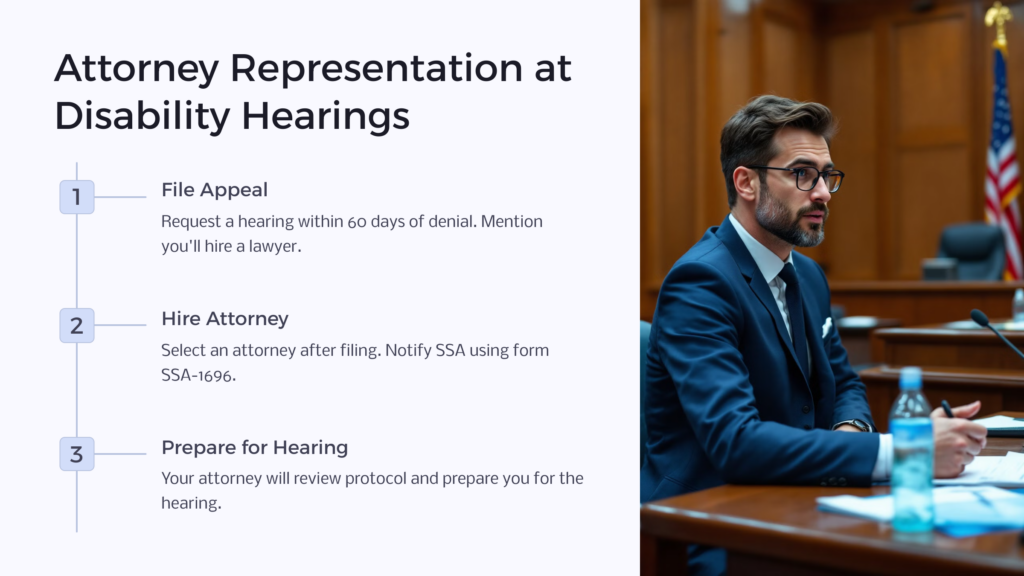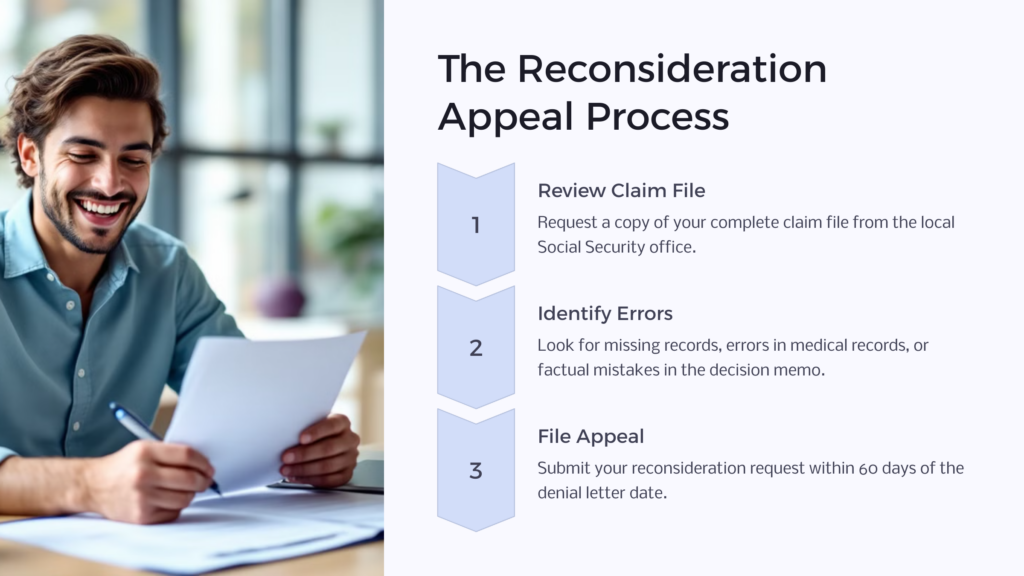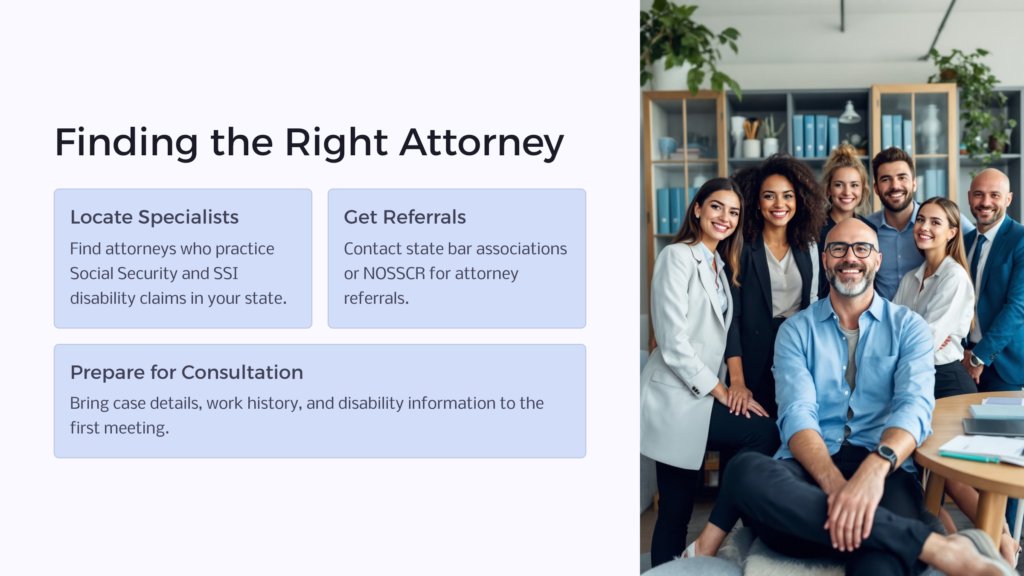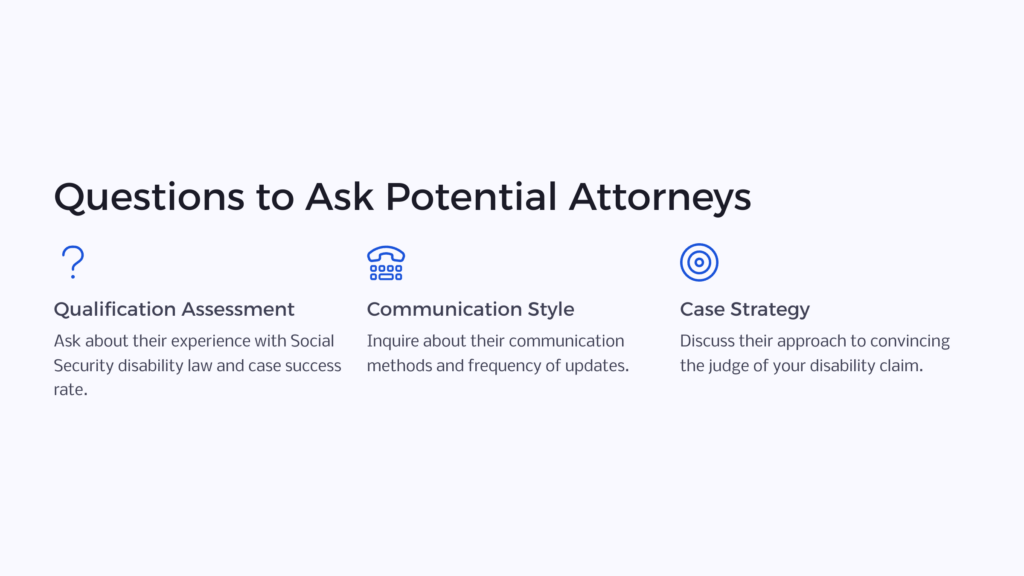If your Social Security Disability (SSDI) or Supplemental Security Income (SSI) claim has been denied and you honestly believe your physical and/or mental health will not allow you to hold down a job in which you can earn at least $1,260 gross wages or net self-employment profit or $2,110 (2020 thresholds) if you are blind after your earnings are reduced by any impairment-related work expenses (IRWE’s) you may have, it is time to appeal the denial. And it is time for a good Social Security Disability lawyer.
Attorney Representation at Disability Hearings

If your claim for Social Security Disability and/or SSI disability has denied twice and you have not already hired a Social Security lawyer to help with your first reconsideration request appeal, your chances of approval at the appeal, a hearing, will be significantly increased by getting a good Social Security attorney now. You can select your attorney after you have requested the hearing because the wait time for a hearing is typically a year or more. So, go ahead and file the request for hearing on your own to make sure that your appeal is filed on time within the allowed sixty-day appeals period. On the hearing form, you can be very general in your reasons for appealing, but be sure to say that you will be hiring a lawyer to represent you and that you will notify the Social Security Administration (SSA) when you have representation. After you have selected and hired an attorney, notify SSA on form SSA-1696, which your attorney or any Social Security office will have.
Prior to the hearing, your attorney will also review with you the hearing protocol–that is, how hearings are usually conducted and what will be expected of you in the hearing. This discussion will happen shortly before the hearing is held so that the information will be fresh in your mind.
Also prior to the hearing, after your attorney has had time to review all the information in your claim file to date, he or she will let you know whether updated information is needed or whether other tests or evaluations could help your claim. Sometimes, the attorney will assess that there is enough information in file to have your claim approved without testimony. In those cases, the attorney will write up a request for the judge to make a favorable decision “on the record” (OTR) from the information in file. The attorney will lay out a written argument on why an approval is supported. If you get an OTR decision, which can only be a fully favorable approval, you’ll be saved the effort and possible anxiety of a hearing.
If the judge does not approve on the record, you will still get a hearing in which you and your attorney can present your case in person. If you do have to go to court—most people with a hearing appeal do go to court—then your attorney will help you prepare for the hearing, secure affidavits, arrange witnesses, and take any other actions appropriate to your claim.
One main area in which an attorney’s expertise is valuable is the evaluation of your vocational (work) history and of your non-medical capacity. Your past work experience, education, and age determine the kinds of work you could potentially do in the future if you did not have functional limitations related to your medical condition. The Administrative Law Judge (ALJ), who will conduct your hearing and decide your medical eligibility, often solicits this vocational information from a vocational expert (VE) at your disability hearing. Once the VE offers an opinion regarding the occupations that you can perform, then the VE should be asked whether you could do those jobs with the functional limitations you have due to your medical condition or conditions. At the hearing, the attorney will act on your behalf, questioning the VE if the attorney thinks that the VE has given incorrect answers or has not been asked all the right questions by the judge.
Similarly, if there is a medical expert (ME) present, an attorney is much more likely than you to recognize when and what questions should be posed to the ME. The attorney may also ask you questions if the judge does not ask questions that bring out everything you could testify to that could help your claim.
Another good reason for having a lawyer for your disability hearing is that it can be comforting to have an active ally with you in court.
The Case for Getting an Attorney for the Reconsideration Appeal

Claims are rarely approved on reconsideration without submission of additional information, and the wait for a hearing after a reconsideration denial runs from one to two years depending on how busy and backlogged the hearing office is in your area. For these reasons, you want to do the best job possible in presenting a winning argument at reconsideration. An experienced Social Security and SSI attorney will be able to help you determine what else might be submitted or clarified to bring about a successful reconsideration appeal.
Of course, to do this, you and the attorney will need to know what is and is not in your claim file to date. So, right after receiving the initial claim denial letter, while you are also identifying attorneys to interview, ask your local Social Security office for a copy of your complete claim file. It may take a few days to get it. You will receive the copy in the form of a CD. If you do not have a computer on which you can run and read the CD, nearly all, if not all, public libraries have computers available for public use. An employee can help you load the CD and bring it up to read. For a fee, you can even print out the contents of the CD file to review at home.
As you review the CD, look for any medical records or statements from doctors, past employers, or others that you thought were in file that are not. Also look for any errors in your medical records and any error of fact (not opinion) in the claim decision memo. Make note of these things so that you can call them to your attorney’s attention. Your attorney is an expert in the law and how our claim facts fit or don’t fit the law, but only you can know what may be missing or incorrect in your claim file.
Don’t Miss the Deadline for Filing Your Appeal
 While you are reviewing your claim file and looking for one or two attorneys with whom you are going to discuss your claim, be sure you file your request for reconsideration or hearing before your sixty-day appeals period ends. The appeals period begins on the date of the denial letter and extends sixty calendar days. An extra five days can be given based on a five-day allowance for mail time in getting the letter to you; but to be safe, get the appeal in within 60 days. On the appeal request, state that you will be submitting additional evidence for the appeal and will be hiring an attorney. Be sure to get a copy of the SSA-561 appeal form date stamped by the Social Security office and request a copy of the date-stamped document. If you cannot file the appeal in person, send it certified mail with signature required, which will give you proof of the filing date. You can also file an appeal online at www.ssa.gov.
While you are reviewing your claim file and looking for one or two attorneys with whom you are going to discuss your claim, be sure you file your request for reconsideration or hearing before your sixty-day appeals period ends. The appeals period begins on the date of the denial letter and extends sixty calendar days. An extra five days can be given based on a five-day allowance for mail time in getting the letter to you; but to be safe, get the appeal in within 60 days. On the appeal request, state that you will be submitting additional evidence for the appeal and will be hiring an attorney. Be sure to get a copy of the SSA-561 appeal form date stamped by the Social Security office and request a copy of the date-stamped document. If you cannot file the appeal in person, send it certified mail with signature required, which will give you proof of the filing date. You can also file an appeal online at www.ssa.gov.
Finding the Right Social Security Disability Attorney for You

The first step in finding the right attorney is to locate attorneys who practice in your state and who include Social Security and SSI disability claims as a substantial part of their practice. You can get referrals to such attorneys from your state’s bar association or from the National Organization of Social Security Claimants’ Representatives (NOSSCR). To get a referral from NOSSCR, call 1-800-431-2804 and request a referral to a Social Security attorney in your area. Some attorneys are part of very large firms that represent Social Security claims in several states; others are associated with local firms of varying sizes and some have their own one-attorney firm. Good representation can be found in all these types of firms.
When you meet with a Social Security Disability attorney for the first time, you are there in the attorney’s office for two equally important reasons: first, to find out whether the attorney thinks you have a viable chance for approval and wants to take you as a client and, second, whether you want the attorney to represent you. The attorney is assessing you and your case and you are assessing whether the attorney is qualified and the right person to represent you.
Getting and reviewing the CD, preparing a list of any errors or omissions that you find in the CD material, and preparing notes about key facts and taking them with you to the consultation will keep you on track during the interview and will go a long way toward the attorney being able to evaluate your claim. Your notes should include the last date you worked before you became disabled, the date of your disability onset (beginning of disability) if it was different from your last day of work, dates of any work since then, the kinds of work you have done in the past fifteen years before disability, and the main reasons you can’t work or can’t work and earn $1,260 gross wages or net profit from self-employment ($2.110 of you are blind) including any problems you had on the job. The attorney may also ask you whether or not you are receiving public welfare assistance because in some cases the state welfare department is repaid from back Supplemental Security Income (SSI) benefits.
Here are some questions you can ask the attorney that will help you decide whether the attorney is the right one for you. Questions later in the list may be in the attorney’s answer to the second question; but if not, go ahead and ask the later questions. (It’s okay to take a list and refer to it.)

- Based on the little bit you now know about me and my claim, do you think that I qualify for Social Security or SSI disability benefits?
- If so, how would you go about convincing the judge (or the reconsideration claims examiner) that I am disabled as defined by Social Security law?
- Will you personally represent me in court? If not, who will and what is their position in the firm and their qualifications to represent me?
- At what point while waiting for a hearing date will you do a full case review and let me know if there are other tests or evaluations I need to have done or other evidence or testimony that needs to be gathered?
- How and when will you communicate with me?
- Will you copy me with all correspondence to the court (or to the Disability Determination Services in case of a reconsideration appeal) and to my doctors?
- When should I communicate with you?
- What do you expect of me as a client?
- Who does what in your office? That is, what can I expect in working with your office?
- How long have you been representing Social Security and SSI applicants?
- What percentage of your practice is Social Security and SSI claims?
The last two questions are to ask yourself:
- Does this attorney appear to be knowledgeable in and experienced with Social Security disability law? (While many, many excellent, experienced attorneys focus their practice or part of their practice on Social Security and SSI claims, there are some attorneys who are not sufficiently experienced and knowledgeable in Social Security law to provide effective representation, so this is a very important question to ask yourself. The attorney’s answers to this point should give you enough of a general impression to make a judgment.)
- Base on how the law office’s employee responsibilities and communication practices were described, does the law office seem organized and likely on top of things?
If the answer to the two question above (especially the first) is yes, ask yourself, on a gut level, does this person feel like the right attorney for you? Know that you are probably anxious about everything at this point and that there are no guarantees about the outcome of your appeal even with the best of attorneys, so try to set aside that general unease you are likely feeling when you attempt to answer either, “Yes, this is the right person” or “No, this is not the right attorney for me.”
If you decide that this is a good attorney to represent you, you can ask the attorney to represent you. It is also perfectly acceptable to give yourself a few days to consider the information and/or wait until you interview another lawyer before making a decision. If you wish to take some time, you can say that you want to consider all the information you have received and you will be back in touch within [a week][two weeks] with a decision about whether you would like the attorney to represent you.
Of course, if the attorney says that your case is doubtful and that he or she doesn’t want to represent you, you should definitely make appointments with one or two more attorneys before either abandoning your claim or deciding to represent yourself.
Working with Your Attorney
A fine line exists between overusing your attorney’s time and keeping your attorney informed about changes in your health and work activity and the attorney keeping you informed about documentation gathered and submitted for your claim or appeal. One way to walk this line successfully is to discuss at the beginning of your relationship when the contract is signed what the attorney’s and your expectations are about communication.
It is reasonable to ask that you receive a brief acknowledgment of anything you submit and it is reasonable to request carbon copies or other notification of all submissions to SSA on your behalf. On the other hand, you cannot expect the attorney to be able to speed up the process except where the attorney judges that an on-the-record (OTR) decision might be possible or you are in danger of foreclosure on your home or eviction from your dwelling or you cannot get critically needed medical care due to lack of funds, in which case you can request that the attorney submit a statement of dire need on your behalf. Even then, OTR reviews usually occur only after a judge has been assigned to your case, which is usually after a year or more after requesting a hearing, and dire need statements usually only accelerate processing or scheduling by a small amount. Once the OTR or dire-need request is made, both situations are beyond the attorney’s control.
You should stay under the care of a physician if at all possible while your appeal pends. Promptly report to your lawyer all significant changes in your health, changes in medical providers or treatment, hospitalizations, and changes in work activity during the appeal process. It is reasonable to ask whether these updates will be forwarded to the DDS or hearing office as applicable. Also, be sure to provide any information the attorney requests and offer your assistance if the attorney is having trouble getting a response from a physician or other source.
When a Lawyer Could Make a Difference on a New Claim
Hiring a lawyer well-versed in Social Security Disability
law to help with your initial claim may save you from having to file a Social Security appeal. The sooner that your claim is laid out fully and clearly to the Social Security Administration, the sooner you are likely to be approved. Your attorney can guide you and your physicians so that all necessary documentation is submitted with your initial claim. Your lawyer will know which medical facts are important to emphasize as related to Social Security’s evidentiary rules and which points your doctors need to cover in any letters they write to support your claim. Similarly, your attorney will know which of your clinical findings and symptoms are signs of disability with your particular physical or mental condition and should be emphasized in your claim.
You should consider engaging legal representation especially if you are disabled by a combination of medical problems that together keep you from working in any occupation but singly do not. For example, you may have one physical condition that limits your being on your feet and another that limits how long you can sit at a time so that there is no occupation within your educational and skill level that you can do throughout a work day; whereas, if you had only one or the other, you would be able to work. Strangely, the more conditions a person has when none is disabling by itself, the harder it can be to prove disability.
Other situations in which an experienced Social Security disability attorney can really make a difference on an initial claim are with those illnesses that are not always disabling, such as fibromyalgia. Having a Social Security attorney can make a crucial difference when you are disabled by high levels of pain or fatigue, which are hard to prove, or by mental illness, especially if you also have a drug or alcohol dependency, which is not covered for benefits.
Why It May Be Hard to Get Attorney Representation for a New Claim.
Social Security and SSI attorneys can charge up representation of 25% of your back pay up to a limit of $6,000. In an initial Social Security Disability claim that is filed quickly after disability begins and that is approved quickly due to the severity of your illness or injury, you could be due no back pay or so little back pay that the attorney’s allowed fee percentage would not be enough to cover the time spent representing you. This means that attorneys may only be able to afford to represent you on a new claim when your disability onset date (the date your disability began) was a good length of time before your application and when your monthly benefit is substantial. Depending on the estimated amount of your monthly benefits, this could be a disability onset seventeen months or more prior to application. The seventeen months is comprised of the maximum retroactive payment of twelve months before application plus the five-month, unpaid disability waiting period, which precedes payment. In this circumstance, the challenge to get representation is even greater with only a Supplemental Security Income (SSI) claim because no SSI benefits are payable for months prior to application.
Whether or not you have representation, your initial application can be approved if you are disabled according to Social Security law and you submit complete and thorough information about the physical and mental demands of your past work and about any challenges you may have had on the job, and you submit medical records and physician statements that clearly explain the medical basis for your diagnoses and support your claimed mental and physical limitations.
When You Might Not Need a Lawyer
If you have a very clear-cut and severe illness or injury that will clearly disable you for more than twelve months or is expected to end in death, then you probably don’t need an attorney for your Social Security Disability or Supplemental Security Income (SSI) claim to be approved. Even so, you might want representation because your disability makes it difficult to act in your own behalf in filing the claim and you do not have a relative or friend to assist with routine filing or just because you want to make things easier for yourself.
 Benefits.com Advisors
Benefits.com Advisors
With expertise spanning local, state, and federal benefit programs, our team is dedicated to guiding individuals towards the perfect program tailored to their unique circumstances.
Rise to the top with Peak Benefits!
Join our Peak Benefits Newsletter for the latest news, resources, and offers on all things government benefits.



















